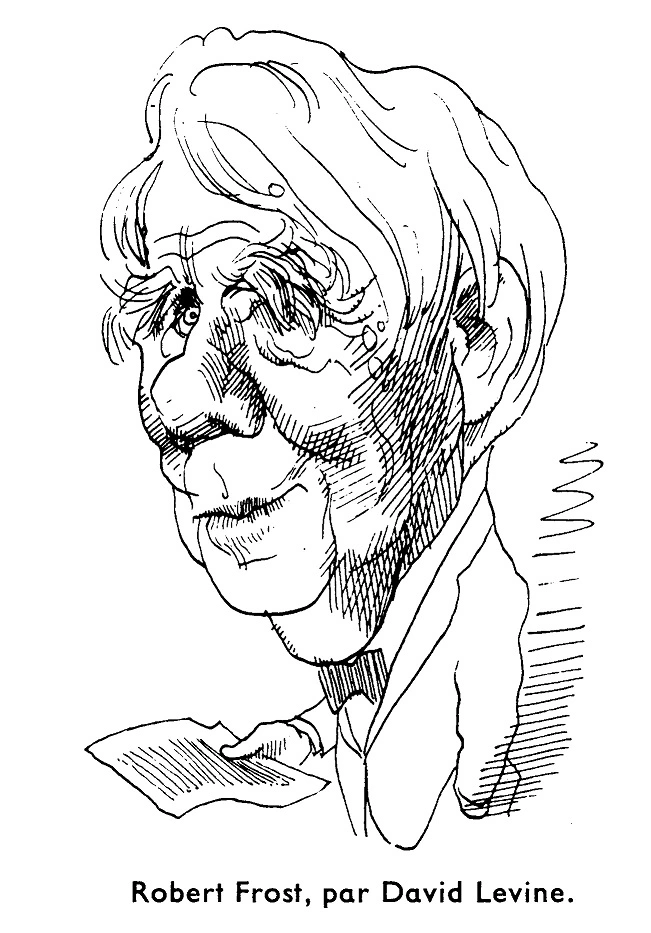
Robert Frost I INTRODUCTION Robert Frost Usually set amid the natural beauty of rural New England, the concise, direct poetry of American poet Robert Frost conveys a wide range of emotions. Frost won the Pulitzer Prize in poetry four times (1924, 1931, 1937, and 1943) and became known across the country when he recited his poem "The Gift Outright" at President John F. Kennedy's inauguration in January 1961. Frost said poetry "makes you remember what you didn't know you knew." The poem "Fire and Ice," according to Frost, "begins in delight, and ends in wisdom." Culver Pictures Robert Frost (1874-1963), American poet, who drew his images from the New England countryside and his language from New England speech. Although Frost's images and voice often seem familiar and old, his observations have an edge of skepticism and irony that make his work, upon rereading, never as old-fashioned, easy, or carefree as it first appears. In being both traditional and skeptical, Frost's poetry helped provide a link between the American poetry of the 19th century and that of the 20th century. See also American Literature: Poetry. II LIFE Robert Lee Frost was born in San Francisco, California, the son of William Prescott Frost, Jr., of New Hampshire and Isabelle Moodie of Scotland. He was named after Robert E. Lee, the commander of the Confederate armies during the American Civil War (1861-1865). When Frost was 11 years old, his father died of tuberculosis. The Frost family then moved to Massachusetts, where William Frost wanted to be buried. Frost attended high school in Lawrence, Massachusetts, and began writing poetry. He attended Dartmouth College briefly but withdrew during his first year and went to work. In 1895 he married Elinor White. The couple eventually had six children, two of whom died young. From 1897 to 1899 Frost attended Harvard College, but he left before receiving a degree. In the early 1900s the family owned a small poultry farm in New Hampshire, and Frost taught at a small private school nearby. Frost continued to write poetry, but he was unsuccessful at publishing his work. Seeking better literary opportunities, the Frosts sold their farm and moved to England in 1912. In England, Frost achieved his first literary success. His book of poems A Boy's Will (1913) was printed by the first English publisher that Frost approached. The work established Frost as an author and was representative of his lifelong poetic style: sparse and technically precise, yet evocative in the use of simple and earthy imagery. His second collection, North of Boston, was published in 1914 and also won praise. In England Frost met other American poets, including fellow New Englander Amy Lowell and the avant-garde writer Ezra Pound. But Frost's work during this time was associated with that of the Georgian poets, a group of English writers whose lyric poetry celebrated the English countryside. The Georgian poets included Robert Graves, Rupert Brooke, Wilfred Owen, and Edward Thomas. In 1915 Frost and his family returned to the United States, where his poetry had become popular. He continued to write for the rest of his life, while living on farms in Vermont and New Hampshire and teaching literature at Amherst College, the University of Michigan, Harvard University, and Dartmouth College. In 1961, at the inauguration of President John F. Kennedy, Frost became the first poet to read a poem--'The Gift Outright"--at a presidential inauguration. III WORKS Frost's poetry mainly reflects life in rural New England, and the language he used was the uncomplicated speech of that region. Although Frost concentrates on ordinary subject matter, he evokes a wide range of emotions, and his poems often shift dramatically from humorous tones to tragic ones. Much of his poetry is concerned with how people interact with their environment, and though he saw the beauty of nature, he also saw its potential dangers. Frost disliked free verse, which was popular with many writers of his time, and instead used traditional metrical and rhythmical schemes. He often wrote in the standard meter of blank verse (lines with five stresses) but ran sentences over several lines so that the poetic meter plays subtly under the rhythms of natural speech. The first lines of 'Birches' (1916) illustrate this distinctive approach to rhythm: 'When I see birches bend to left and right/ Across the lines of straighter darker trees,/ I like to think some boy's been swinging them." Frost listened to the speech in his country world north of Boston, and he recorded it. He had what he called 'The ruling passion in man ... a gregarious instinct to keep together by minding each other's business.' Frost continued to mind his neighbors' speech and business in his volume Mountain Interval (1916), which included the poems 'The Road Not Taken,' 'An Old Man's Winter Night,' 'Birches,' 'Putting in the Seed,' 'Snow,' and 'A Time to Talk.' Frost's 1923 volume New Hampshire earned him the first of four Pulitzer Prizes that he would win over the next 20 years. The volume included longer poems that told stories, such as 'Paul's Wife' and 'The Witch of Coös,' as well as short meditations on various subjects. These meditations include 'Fragmentary Blue,' 'Fire and Ice,' 'Nothing Gold Can Stay,' and 'Stopping by Woods on a Snowy Evening,' which is perhaps Frost's best-known poem. The poem's ending, in which the line "And miles to go before I sleep" is repeated, indicates Frost's philosophy of continual and productive work--whether it be work on his New England farm, or the written work required to create his poetry. In the title poem of New Hampshire, Frost makes an explicit statement about his beliefs. He declares how much he would 'hate to be a runaway from nature,' and asserts that people must make the best of life. He accepts pain or pleasure with indifference but expects more of the former than of the latter, saying that he makes "a virtue of my suffering" and that he will "not lack for pain to keep me awake." Frost's Collected Poems (1930) won him his second Pulitzer Prize. And his next two collections--A Further Range (1936) and A Witness Tree (1942)--also won Pulitzers. He then wrote two plays in blank verse. The first, A Masque of Reason (1945), received lukewarm praise from critics. The second, A Masque of Mercy (1947), which is a modern treatment of Christian biblical figures, was more successful. Frost's final volumes of poetry were Steeple Bush (1947) and In the Clearing (1962). The masterpiece of the first collection is 'Directive.' In this complex poem, rich words and images direct a reader to escape the present that is "now too much for us" by remembering a past time and place, which memory has "...made simple by the loss/ of detail..." The poem concludes with symbolic lines about the value of returning to one's roots: 'Here are your waters and your watering place./ Drink and be whole again beyond confusion.' Microsoft ® Encarta ® 2009. © 1993-2008 Microsoft Corporation. All rights reserved.



































